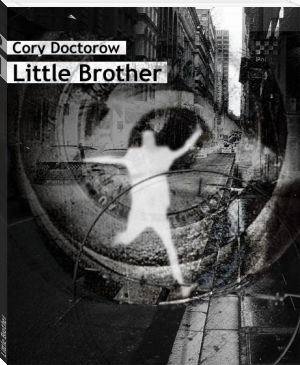Little Brother - Cory Doctorow (book recommendations website txt) 📗

- Author: Cory Doctorow
Book online «Little Brother - Cory Doctorow (book recommendations website txt) 📗». Author Cory Doctorow
Here's a better idea: start intercepting the spy's communications and feed him and his masters misinformation. Say his masters instruct him to gather information on your movements. Let him follow you around and take all the notes he wants, but steam open the envelopes that he sends back to HQ and replace his account of your movements with a fictitious one. If you want, you can make him seem erratic and unreliable so they get rid of him. You can manufacture crises that might make one side or the other reveal the identities of other spies. In short, you own them.
This is called the man-in-the-middle attack and if you think about it, it's pretty scary. Someone who man-in-the-middles your communications can trick you in any of a thousand ways.
Of course, there's a great way to get around the man-in-the-middle attack: use crypto. With crypto, it doesn't matter if the enemy can see your messages, because he can't decipher them, change them, and re-send them. That's one of the main reasons to use crypto.
But remember: for crypto to work, you need to have keys for the people you want to talk to. You and your partner need to share a secret or two, some keys that you can use to encrypt and decrypt your messages so that men-in-the-middle get locked out.
That's where the idea of public keys comes in. This is a little hairy, but it's so unbelievably elegant too.
In public key crypto, each user gets two keys. They're long strings of mathematical gibberish, and they have an almost magic property. Whatever you scramble with one key, the other will unlock, and vice-versa. What's more, they're the only
keys that can do this -- if you can unscramble a message with one key, you know
it was scrambled with the other (and vice-versa).
So you take either one of these keys (it doesn't matter which one) and you just publish
it. You make it a total non-secret
. You want anyone in the world to know what it is. For obvious reasons, they call this your "public key."
The other key, you hide in the darkest reaches of your mind. You protect it with your life. You never let anyone ever know what it is. That's called your "private key." (Duh.)
Now say you're a spy and you want to talk with your bosses. Their public key is known by everyone. Your public key is known by everyone. No one knows your private key but you. No one knows their private key but them.
You want to send them a message. First, you encrypt it with your private key. You could just send that message along, and it would work pretty well, since they would know when the message arrived that it came from you. How? Because if they can decrypt it with your public key, it can only
have been encrypted with your private key. This is the equivalent of putting your seal or signature on the bottom of a message. It says, "I wrote this, and no one else. No one could have tampered with it or changed it."
Unfortunately, this won't actually keep your message a secret
. That's because your public key is really well known (it has to be, or you'll be limited to sending messages to those few people who have your public key). Anyone who intercepts the message can read it. They can't change it and make it seem like it came from you, but if you don't want people to know what you're saying, you need a better solution.
So instead of just encrypting the message with your private key, you also
encrypt it with your boss's public key. Now it's been locked twice. The first lock -- the boss's public key -- only comes off when combined with your boss's private key. The second lock -- your private key -- only comes off with your public key. When your bosses receive the message, they unlock it with both keys and now they know for sure that: a) you wrote it and b) that only they can read it.
It's very cool. The day I discovered it, Darryl and I immediately exchanged keys and spent months cackling and rubbing our hands as we exchanged our military-grade secret messages about where to meet after school and whether Van would ever notice him.
But if you want to understand security, you need to consider the most paranoid possibilities. Like, what if I tricked you into thinking that my
public key was your boss's public key? You'd encrypt the message with your private key and my public key. I'd decrypt it, read it, re-encrypt it with your boss's real
public key and send it on. As far as your boss knows, no one but you could have written the message and no one but him could have read it.
And I get to sit in the middle, like a fat spider in a web, and all your secrets belong to me.
Now, the easiest way to fix this is to really widely advertise your public key. If it's really
easy for anyone to know what your real key is, man-in-the-middle gets harder and harder. But you know what? Making things well-known is just as hard as keeping them secret. Think about it -- how many billions of dollars are spent on shampoo ads and other crap, just to make sure that as many people know about something that some advertiser wants them to know?
There's a cheaper way of fixing man-in-the-middle: the web of trust. Say that before you leave HQ, you and your bosses sit down over coffee and actually tell each other your keys. No more man-in-the-middle! You're absolutely certain whose keys you have, because they were put into your own hands.
So far, so good. But there's a natural limit to this: how many people can you physically meet with and swap keys? How many hours in the day do you want to devote to the equivalent of writing your own phone book? How many of those people are willing to devote that kind of time to you?
Thinking about this like a phonebook helps. The world was once a place with a lot of phonebooks, and when you needed a number, you could look it up in the book. But for many of the numbers that you wanted to refer to on a given day, you would either know it by heart, or you'd be able to ask someone else. Even today, when I'm out with my cell-phone, I'll ask Jolu or Darryl if they have a number I'm looking for. It's faster and easier than looking it up online and they're more reliable, too. If Jolu has a number, I trust him, so I trust the number, too. That's called "transitive trust" -- trust that moves across the web of our relationships.
A web of trust is a bigger version of this. Say I meet Jolu and get his key. I can put it on my "keyring" -- a list of keys that I've signed with my private key. That means you can unlock it with my public key and know for sure that me -- or someone with my key, anyway -- says that "this key belongs to this guy."
So I hand you my keyring and provided that you trust me to have actually met and verified all the keys on it, you can take it and add it to your keyring. Now, you meet someone else and you hand the whole ring to him. Bigger and bigger the ring grows, and provided that you trust the next guy in the chain, and he trusts the next guy in his chain and so on, you're pretty secure.
Which brings me to keysigning parties. These are exactly
what they sound like: a party where everyone gets together and signs everyone else's keys. Darryl and I, when we traded keys, that was kind of a mini-keysigning party, one with only two sad and geeky attendees. But with more people, you create the seed of the web of trust, and the web can expand from there. As everyone on your keyring goes out into the world and meets more people, they can add more and more names to the ring. You don't have to meet the new people, just trust that the signed key you get from the people in your web is valid.
So that's why web of trust and parties go together like peanut butter and chocolate.
"Just tell them it's a super-private party, invitational only," I said. "Tell them not to bring anyone along or they won't be admitted."
Jolu looked at me over his coffee. "You're joking, right? You tell people that, and they'll bring extra
friends."
"Argh," I said. I spent a night a week at Jolu's these days, keeping the code up to date on indienet. Pigspleen actually paid me a non-zero sum of money to do this, which was really weird. I never thought I'd be paid to write code.
"So what do we do? We only want people we really trust there, and we don't want to mention why until we've got everyone's keys and can send them messages in secret."
Jolu debugged and I watched over his shoulder. This used to be called "extreme programming," which was a little embarrassing. Now we just call it "programming." Two people are much better at spotting bugs than one. As the cliche goes, "With enough eyeballs, all bugs are shallow."
We were working our way through the bug reports and getting ready to push out the new rev. It all auto-updated in the background, so our users didn't really need to do anything, they just woke up once a week or so with a better program. It was pretty freaky to know that the code I wrote would be used by hundreds of thousands of people, tomorrow
!
"What do we do? Man, I don't know. I think we just have to live with it."
I thought back to our Harajuku Fun Madness days. There were lots of social challenges involving large groups of people as part of that game.
"OK, you're right. But let's at least try to keep this secret. Tell them that they can bring a maximum of one person, and it has to be someone they've known personally for a minimum of five years."
Jolu looked up from the screen. "Hey," he said. "Hey, that would totally work. I can really see it. I mean, if you told me not to bring anyone, I'd be all, 'Who the hell does he think he is?' But when you put it that way, it sounds like some awesome 007 stuff."
I found a bug. We drank some coffee. I went home and played a little Clockwork Plunder, trying not to think about key-winders with nosy questions, and slept like a baby.
Sutro baths are San Francisco's authentic fake Roman ruins. When it opened in 1896, it was the largest indoor bathing house in the world, a huge Victorian glass solarium filled with pools and tubs and even an early water slide. It went downhill by the fifties, and the owners torched it for the insurance in 1966. All that's left is a labyrinth of weathered stone set into the sere cliff-face at Ocean Beach. It looks for all the world like a Roman ruin, crumbled and mysterious, and just beyond them is a set of caves that let out into the sea. In rough tides, the waves rush through the caves and over the ruins





Comments (0)